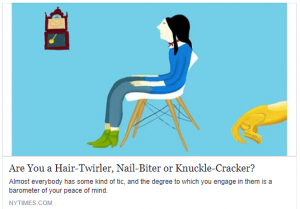 I have a tic. I don’t do it so often anymore, but since I was a kid I’ve picked at my cuticles. It comes back occasionally when I’m nervous.
I have a tic. I don’t do it so often anymore, but since I was a kid I’ve picked at my cuticles. It comes back occasionally when I’m nervous.
This kind of behavior begins as an option on the menu of motor options in the part of the brain known as the basal ganglia. The basal ganglia is involved in planning movement, and in other things like emotion. When we are nervous (over-stimulated) or bored (under-stimulated), the basal ganglia makes a selection from a menu of learned behaviors, or habits. Tics and nervous habits give us some kind of reward – in my case it’s probably distraction from whatever has triggered nervousness.
The good news is that when the basal ganglia chooses one of our default motor behaviors, what’s happening is that it’s not inhibiting that behavior. And the other good news is that inhibition is one of the things that the Alexander Technique teaches. Inhibition is the ability to say “no” to things we don’t want (like excess tension), or to “turn off” that activity in our mind-body.
Of course habits will come back and we are always developing new ones, but thanks to the Alexander Technique, I’ve learned to recognize habits of contraction and more easily return to a place of equanimity. Practicing the Alexander Technique, I have learned to give priority to not compressing my spine, and that training is what has taught me to let go of unhelpful habits.
Next time you find yourself reacting in automatic pilot in a way you don’t like or that is harmful to you, like reaching for a cigarette, yelling in anger, tensing your neck or biting your finger nails, give yourself permission to pause for just a moment to just observe yourself. That pause in that “critical moment” is where change begins.
If you’d like to learn more about how Alexander Technique helps change unhelpful habits, write me at info@discoverease.how to schedule a one-on-one, group or online class. You can also subscribe to receive these tips here and read past articles here. If you find this useful, please feel free to pass it on to friends or colleagues who may be interested.

Recent Comments